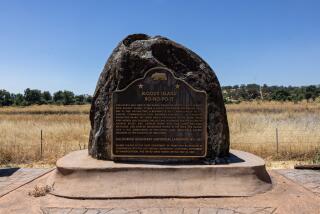Sing a Song of Coalinga, Eagle Rock and Weed . . .
- Share via
I have fallen in love with American names,
The sharp names that never get fat,
The snakeskin titles of mining claims,
The plumed war-bonnet of Medicine Hat,
Tucson and Deadwood and Lost Mule Flat. --From “American Names”by Stephen Vincent Benet
My family used to live in a mountain valley near a mining community in the wilds of northern Idaho, and our mailing address was Star Route, Smelterville, Ida. The name Smelterville is anything but sharp, and it isn’t exactly a snakeskin title, either. I remember how oddly self-conscious I used to feel as a boy when I ordered things through the mail from mythic metropolises like Chicago and New York City and was forced to locate myself in so unglamorous-sounding a place as Smelterville, Ida. I didn’t know then that Idaho is an Indian word that means roughly “light on the mountains,” and consequently is as pretty a name as Smelterville is dirty. The word Smelterville would seep from my pen with the same sluggish morbidity with which the wastes from the mines in the area infiltrated and obfuscated some of the local streams and rivers.
Back then, I thought that typical Americans (i.e., the typical American families in radio and TV shows and movies and comic books) lived in towns with straightforward, idyllic names that could be gotten by mixing any of a couple of dozen nouns and adjectives--oak, palm, sun, wood, lake, view, green, dale, glen, hill, falls, grove, spring, and so forth. Archie Andrews lived in Riverdale, Henry Aldrich lived in Centerville, Pepper Young’s family lived in Elmwood. Typical Americans, it seemed, never lived in places like Smelterville.
These formulaic stereotypes aside, there is, as Benet asserts, something special about American place names. I think the reason is that they are made up of words from so many different languages: Angola-on-the-Lake, Cinnaminson, Ho-Ho-Kus, Isla Vista, Kaawa, Lost Nation, Pend Oreille, Quapaw, Vermilion, Xenia. . . . American place names fill the mouth with soft utterance and hard articulation, bird song and verbal grapeshot. Consider the many and varied moods and impressions evoked by the names Vanessa, Crazy Horse, Algernon, Jove, Silver City, Loon Lake, Wounded Knee.
Pick a state, any state, and take a close look at the map of it and feast your eye and mind on the wealth of colorful, eccentric, and fascinating names our forebears attached to streams, valleys, meadows, hills, towns, mountains, rivers, roads and the like. Then recall that this heroic task of naming every place in America was for the most part performed in a few decades, as men and women swarmed westward across the plains and over the mountains. Hundreds of thousands of names, summarily served up, ladled out, tacked on--just as, no doubt, will one day happen on Mars.
Our country is little more than 200 years old, and already much of the history of its place names has been lost in the headwaters of the Rio Tempora, untraceable in the darkling reach of the past.
Some day, in the far, far future, visitors to our planet may dig around in the ruins armed only with a 1936 Webster’s. Imagine what they’ll make of us from shards marked Universal City, Bell Gardens, Weed and Magic Mountain.


